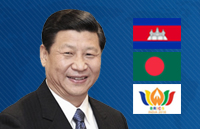China-US movie cooperation keeps gathering steam
By Chang Jun (chinadaily.com.cn) Updated: 2016-10-18 09:20Among all of the business sectors that China and the United States are cooperating and cutting deals in, the movie industry seems to be catching fire at an unprecedented pace.
Like all Star Wars fans, I am champing at the bit over the trailer for Rogue One: A Star Wars Story, the latest episode of the blockbuster sci-fi saga which will have its US premiere on December 16. I'm also thrilled to see that for the first time in a George Lucas film, two Chinese actors — Donnie Yen and Jiang Wen — are in its lead cast.
Both among the highest-paid and most famous actors in China, Yen and Jiang are expected to generate lucrative box office returns from China for this Star Wars episode. After all, China is the second-largest movie market, second only to the US currently, and is expected to surpass the US by 2017 in terms of box office revenue and number of cinemas.
In 2014 alone, Chinese films harvested $4.8 billion in box office revenue, a 36 percent increase from 2013 and a clear challenge to the supremacy of imported American blockbusters.
According to John Berra, lecturer in film and language studies at Renmin University in Beijing, movie industry cooperation between the world's two largest economies is not "simply making mutually beneficial arrangements for distribution" but "Hollywood studios and major American independent companies are establishing relationships with China's film market to design blockbusters with cross-cultural appeal," just like Lucasfilm does with its newly released Star Wars.
Meanwhile, more and more deep-pocket Chinese enterprises are seeking to enter the American market through calculated acquisitions, "or provide localized services to US studios that require a more direct connection to China's valuable consumer class."
Although market cooperation in movies between China and the US is nothing new, I'm feeling a bit overwhelmed after receiving two invitations to two events, both in Los Angeles in early November, events that should only add to the momentum of this burgeoning sector.
One is the seventh annual Asia Society Southern California's US-China Film Summit, considered one of the most prestigious gatherings of Hollywood and Chinese film industry leaders. It will be held on Nov 1-2.
The other one, the Chinese American Film Festival (CAFF), which is in its 12th year, will convene on the same days and in the same city as the film summit. The festival this year will focus on market trends in China-US movie co-productions.
Since its debut in 2010, the US-China Film Summit has engaged movie industry leaders and policy makers in conversations about US-China film co-production, cross-border investment and the integration of Chinese and American talent.
High-profile speakers have included Michael Ellis, Asia-Pacific president and managing director of the Motion Picture Association; IMAX Entertainment CEO Greg Foster; Beijing Film Academy Chairman Hou Guangming; and China Film Co-Production Corporation President Miao Xiaotian.
In 2015, the summit honored Chinese director Zhang Yimou and Zhang Zhao, CEO of Le Vision Pictures, who are collaborating on The Great Wall, the biggest US-China co-production to date. The Great Wall, starring Matt Damon, Jing Tian, Pedro Pascal, Willem Dafoe, Lu Han, and Andy Lau, began principal photography in March of 2015 and is to be released in China on Dec 16 and in the US on Feb 17, 2017.
According to organizers, this year's Summit will highlight animation, digital and immersive entertainment and the development of trans-Pacific talent and financing.
It will also honor director Lu Chuan, writer and director Cao Baoping, Huayi Brothers Media CEO James Wang and Melissa Cobb, chief creative officer at Oriental DreamWorks, for their industry leadership and dedication to pushing US-China collaborations in the film industry to new highs.
Contact the writer at junechang@chinadailyusa.com.







